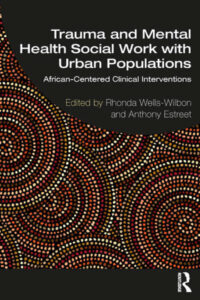
HBCU Researcher Spotlight
Racism and Mental Health: A conversation with Dr. Terra Bowen-Reid, Associate Professor of Psychology at Morgan State University
Article by: Sara Partridge, Ph.D.
In a recently-published book chapter titled “Living While Black: The Psychophysiological Health Implications of Vicarious Racial Trauma,” Dr. Terra Bowen-Reid returned to an area of research she began to pursue in graduate school: the relationship between racism and health. This interest was spurred, in part, by a personal experience. Her uncle died prematurely—in his 50s—and her cousin remarked that “racism had killed him.” Bowen-Reid pondered this, and then sought to investigate the ways in which systemic racism might play a role in not only the mental, but also the physical, health of Black Americans.
 In this chapter co-authored by Ingrid K. Tulloch and collected in Trauma and Mental Health Social Work with Urban Populations: African-Centered Clinical Interventions (Routledge, 2022), edited by Rhonda Wells-Wilbon and Anthony Estreet, Bowen-Reid describes the psychophysiological mechanisms through which racism impacts health.
In this chapter co-authored by Ingrid K. Tulloch and collected in Trauma and Mental Health Social Work with Urban Populations: African-Centered Clinical Interventions (Routledge, 2022), edited by Rhonda Wells-Wilbon and Anthony Estreet, Bowen-Reid describes the psychophysiological mechanisms through which racism impacts health.
Racist experiences are, in essence, stressors. Those that rise to the level of trauma “lead to distress or profound sense of danger related to real or perceived experiences due to one’s race” (Bowen-Reid, 2022, referencing Bryant-Davis and Ocampo, 2006). Racial trauma can lead to “psychological symptoms, such as anxiety, hypervigilance to threat, or hopelessness” (Bowen-Reid, 2022). Frequent or recurrent experience of racism, furthermore, can work as chronic stressors in the lives of people of color, which ultimately “affect physical outcomes” as well as mental and emotional health (Bowen-Reid, 2022).
There are well-known biochemical processes that link stress and poor health. Bowen-Reid writes: “Physiological responses to stress are caused by neuroendocrine activity,” in which “the body’s adrenal glands release stress chemicals called epinephrine and cortisol.” Repeated stressful experiences increase an individuals’ allostatic load, or the biological “wear and tear” on the body. Ultimately, this chronic strain contributes to weakened vascular function and higher incidences of “high blood pressure, stroke, cognitive dysfunction, and cardiac arrests” (Bowen-Reid, 2022, referencing Juster, McEwan, and Lupien, 2010).
Bowen-Reid emphasizes the importance of trauma-informed mental health care, self-care, and limited exposure to vicarious sources of trauma for Black Americans, such as the images and videos of violence against Black people that circulate in the media. “Racism is ingrained in the fabric of society,” she says, “but, mentally, how do we protect ourselves in the meantime?” She recommends practices of self-care, such as physical exercise, a healthy diet, and rest time to decompress from life’s stressors. Her earlier research also considered how spirituality, knowledge, and one’s worldview can work as protective factors in the maintenance of mental wellness (see Bowen-Reid, 2002).
In a recent conversation with the Payne Center, Bowen-Reid also addressed the institutional structures that hinder adequate research on mental health for Black Americans. In general, HBCUs have been “at the forefront of doing proactive research” to address problems facing Black communities, she says. There is an urgent need to develop authentic research partnerships between HBCUs and PWIs, in which the research is informed by the perspective and experiences of Black researchers. The most effective research, furthermore, will seek practical solutions that can have a real impact beyond citation metrics.
HBCU faculty face numerous barriers to research, whether it be the high teaching loads, greater demands for university service or undergraduate mentoring, or mainstream fields that underrepresent their subjects and are less likely to award them research dollars and scholarly attention. While HBCU faculty like Bowen-Reid may feel pulled in many directions, she and her colleagues are “committed to preparing the next wave of scholars” to continue to pursue research to improve the lives of Black Americans. “The climate is ripe for this body of research,” she tells me. “The last couple years brought the importance of mental health care to the forefront of our national discussions.”
Sources
Bowen-Reid, T. L., & Harrell, J. P. (2002). Racist experiences and health outcomes: An examination of spirituality as a buffer. Journal of Black Psychology, 28(1), 18–36. https://doi.org/10.1177/0095798402028001002
Bowen-Reid, T. L., & Tulloch, I. K. (2022). Living while Black: The psychophysiological health implications of vicarious racial trauma. Trauma and Mental Health Social Work with Urban Populations, 13-25.
Bryant-Davis, T., & Ocampo, C. (2006). A therapeutic approach to the treatment of racist-incident-based trauma. Journal of Emotional Abuse, 6(4), 1-22.
Juster RP, McEwen BS, Lupien SJ. Allostatic load biomarkers of chronic stress and impact on health and cognition. Neurosci Biobehav Rev. 2010 Sep;35(1):2-16.